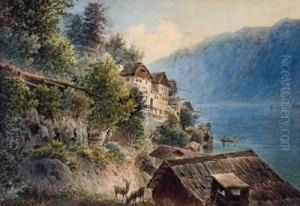Friedrich Ii Reinhold Paintings
Friedrich II Reinhold, also known as Friedrich Reinhold von Berg, was a notable figure in the Enlightenment era, although he is not as widely recognized as some of his contemporaries in the field of art. Born on October 11, 1744, in Kuressaare, on the island of Saaremaa in Estonia, he was part of the Baltic German community, which played a significant role in the cultural and intellectual life of the region during the 18th and 19th centuries.
Reinhold started his career in the military service of the Russian Empire and rose to the rank of general. His contributions, however, were not limited to his military endeavors. He was also engaged in intellectual and administrative pursuits, reflecting the ideals of the Enlightenment that emphasized reason, science, and progress. Reinhold contributed to various reforms in the Russian Empire, particularly in the areas of education and local governance.
Despite his involvement in these broader activities, Reinhold’s connection to the arts primarily comes through his role as a patron and an administrator rather than as an artist himself. During his lifetime, he would have been exposed to the neoclassical artistic trends that were prevalent in Europe, a style that sought to return to the aesthetics and principles of classical antiquity.
Friedrich II Reinhold passed away on February 28, 1812, in Jõgeveste, present-day Estonia. His legacy is more closely associated with his administrative and reformative contributions to the Russian Empire, rather than direct artistic achievements. Nevertheless, his life reflects the interconnected nature of military, administrative, and cultural spheres in the context of Enlightenment Europe.
